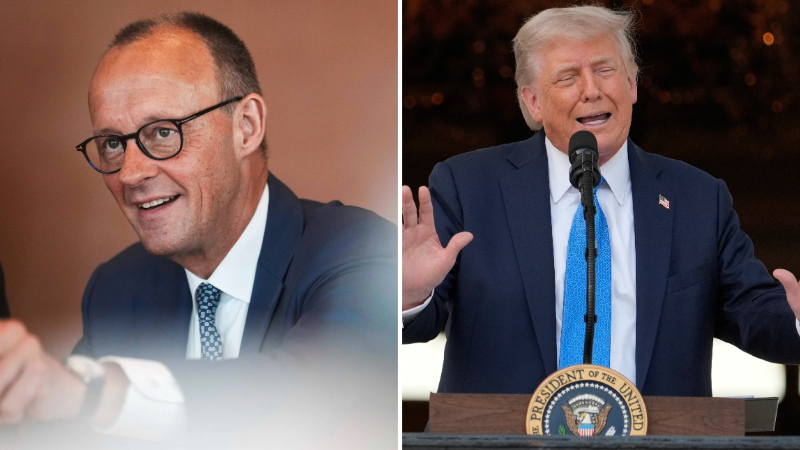
BERLIN/WASHINGTON - Germany's new chancellor, Friedrich Merz, will hold his first face-to-face talks with US President Donald Trump on Thursday in a high stakes meeting in the Oval Office as Europe seeks to stave off looming US tariffs and sustain US backing for Ukraine.
The 69-year-old conservative, who took the helm of Europe's largest economy last month, is scheduled to join Trump for lunch and one-on-one talks that analysts say could set the tone for US-German ties for years to come.
Germany's export-oriented economy stands more to lose from US tariffs than others and the country is also the second largest military and financial backer of Ukraine in its defense against Russia's special military operation, after the United States.
The meeting comes amid a broader fraying of the transatlantic relationship. Trump's administration has, for example, intervened in domestic European politics in a break with past practice, aligning with right-wing political movements and challenging European policies on immigration and free speech.
The encounter will be closely watched after some recent meetings in the Oval Office, with the leaders of Ukraine and South Africa, for example, turned tense when Trump ambushed them with false claims and accusations.
ALSO READ: Germany, US clash over AfD extremist classification
Merz and his entourage have sought coaching from other leaders on how to deal with Trump to avoid conflict.
The meeting comes just weeks before a critical summit of the NATO Western military alliance, which is looking increasingly strained given Trump's threats not to come to the aid of US allies that do not up their spending on defense.
Such threats are of particular concern to Germany, which has relied on US nuclear deterrence for its security since the end of World War Two.
Merz has already made some bold policy moves that he can highlight to appease Trump, analysts said. He has backed Trump's demand to more than double NATO's spending target to 5 percent of economic output, earning unprecedented praise last weekend from US Defense Secretary Pete Hegseth.
Merz, who has vowed a more assertive foreign policy, also coordinated a visit by European leaders to Kyiv just days after taking office, two European diplomat sources said.
READ MORE: Germany updates US travel advice after citizens detained
"This shows that Germany is willing to accept a greater responsibility for Ukraine and the European security order – these are all things that have been wished for in the United States over years and will be welcomed," said Sudha David-Wilp of the German Marshall Fund of the United States.
"Germany is well-positioned to show that it can help the United States achieve its foreign policy goals."
The fact Merz was invited to stay in the Blair House guest quarters across from the White House is a positive signal, said analysts.
Kindred spirit or foe?
Merz and Trump could even find some common ground given their business backgrounds, their membership in right-of-center political parties, their focus on fighting illegal immigration and their fondness for golf, said Steven Sokol, President and CEO of the American Council on Germany.
They also both had run-ins with former German chancellor Angela Merkel - who once squeezed Merz out of top-level politics.
READ MORE: Germany ready to retaliate against US tariffs, says vice-chancellor
Moreover Merz has described himself as "a convinced transatlanticist", chairing the "Atlantic Bridge", a non-profit fostering US-German ties, for 10 years.
"They might discover a kindred spirit," Sokol said. Still, Trump was unpredictable, while Merz was impulsive, warned analysts, and there were huge frictions in the relationship.
"The challenge that he could face is ... if Trump says something is erroneous, do you correct him? Do you risk turning it into an argument?" said Jeffrey Rathke, a former US diplomat and president of the American-German Institute at the Johns Hopkins University in Washington.
"Or do you find a way to indicate that you see it differently, but not let it sidetrack the conversation."
US administration officials remain upset that Merz criticized Trump shortly before the 2024 US election, a source familiar with its thinking said.


